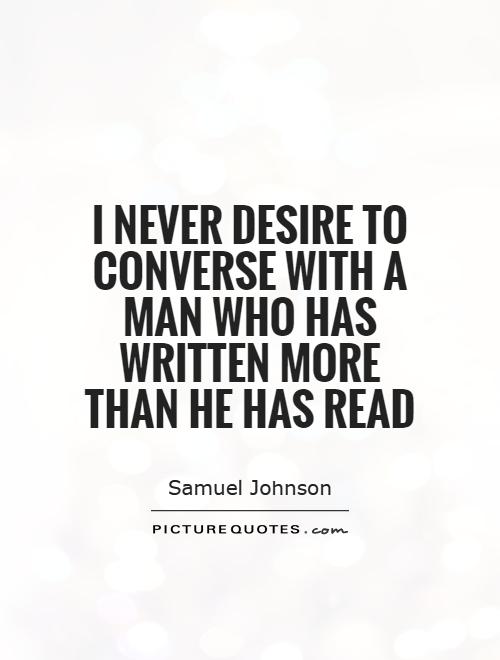I never desire to converse with a man who has written more than he has read

I never desire to converse with a man who has written more than he has read
Samuel Johnson, the renowned English writer, critic, and lexicographer, was a firm believer in the importance of reading in order to become a well-rounded and knowledgeable individual. He famously stated, "I never desire to converse with a man who has written more than he has read," highlighting his belief that true wisdom and insight can only come from a deep and thorough engagement with the works of others.Johnson's own voracious reading habits were well-known, and he often cited the works of other authors in his own writings. He believed that reading was essential for developing one's intellect, expanding one's knowledge, and honing one's critical thinking skills. By immersing oneself in the thoughts and ideas of others, one could gain a broader perspective on the world and better understand the complexities of human nature.
In Johnson's view, writing without first engaging with the ideas and perspectives of others was a futile exercise. A writer who had not read widely would lack the depth of knowledge and insight necessary to produce meaningful and impactful work. Johnson believed that writing should be a reflection of one's intellectual curiosity and engagement with the world, rather than a mere exercise in self-expression.
Furthermore, Johnson saw reading as a way to connect with the broader intellectual tradition of humanity. By engaging with the works of past and present thinkers, one could participate in a dialogue that transcended time and space. Johnson believed that reading was a way to tap into the collective wisdom of humanity and to learn from the successes and failures of those who had come before.












 Friendship Quotes
Friendship Quotes Love Quotes
Love Quotes Life Quotes
Life Quotes Funny Quotes
Funny Quotes Motivational Quotes
Motivational Quotes Inspirational Quotes
Inspirational Quotes